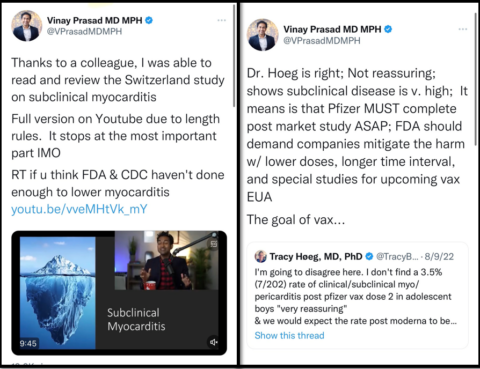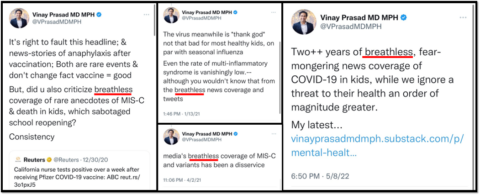Part 1 is available here
“There is No COVID Heart”
, and
Cardiac magnetic resonance scans done during convalescence showed that nearly half of the individuals had no major heart abnormalities, and 9 out of 10 had normal heart function.
“Subclinical Myocarditis”
However, something happened that completely changed their opinion on screening low-risk patients for cardiac damage. A study from Thailand found the COVID vaccine caused an elevated troponin (a marker of cardiac injury) in 4 of 301 (1.3%) of children who had no cardiac symptoms. In contrast to COVID patients with actual Dr. Prasad felt these children had a retted extensively about “subclinical myocarditis” on social media, as well as his monetized YouTube and Substack channels.


Not all doctors were so concerned about this abnormal lab value. Dr. Frank Han, a pediatric cardiologist who has actually treated patients with vaccine-myocarditis and published on it, discussed “subclinical myocarditis” here at SBM. He wrote:
The definition of subclinical myocarditis is a patient with lab, imaging, or EKG findings consistent with myocarditis, but minimal or no symptoms (minimal chest pain, shortness of breath, or palpitations for example).
In other words, someone with “subclinical myocarditis” feels fine, and abnormal lab values are not synonymous with myocarditis. As Dr. Han explained:
Troponins are a useful test to help confirm myocarditis, but I emphasize that troponin in the bloodstream is not diagnostic of myocarditis by itself – it is a cardiologist’s role is to sort out all the other causes of troponin in the bloodstream such as physical exercise… Cardiologists have formalized the criteria for myocarditis to avoid diagnosing every person with troponin in the blood with myocarditis. This would be misdiagnosis and, unnecessarily frighten the patient
Indeed, a vigorous game of soccer can elevated troponin levels in children. So can COVID. One study found 7% of children with COVID had “subclinical myocarditis,” though the authors wisely concluded:
Routine troponin screening does not yield much information in previously healthy paediatric COVID-19 patients without any sign of myocardial dysfunction. Elevated troponin levels may be observed but it is mostly a sign of myocardial injury without detectable myocardial dysfunction in this group of patients.
While this makes sense to me, it’s certainly possible that “subclinical myocarditis” will lead to a scar and cause a problematic arrhythmia in the future. However, to the extent that this is to be feared, the virus poses a greater threat than the vaccine. Most importantly, the danger is entirely theoretical.
This is not true of COVID itself, of course. It has killed around 2,000 children and hospitalized 200,000 more. Some of these children are very sick, needing mechanical ventilation in the ICU. Rarely, children have had strokes, seizures, or needed amputations. Around 9,500 children have developed MIS-C, and most of these children go to the ICU. At least 79 children have died from it. Not all children feel back to normal after their infection and we have to be humble about the possibility of long-term consequences of repeated infection.
This all seems worse than an elevated troponin level in a child who feels fine, does it not?
Theoretical Versus Real Harms
Fortunately, multiple studies have shown the vaccine can drastically lower these rare, but grave harms in children. This is why the authors of the paper from Thailand on “subclinical myocarditis” concluded:
Overall, COVID-19 mRNA vaccination has an extremely favorable outcome and should be recommended for adolescents.
Many doctors felt otherwise, and Dr. Han also noticed the tendency of those who worry about “subclinical myocarditis” to be much less concerned about known harms of the virus. He wrote:
The crowd that is most anti-COVID vaccination is very supportive of the finding of subclinical myocarditis in this article without considering its limitations…people who wish to instill fear about vaccination myocarditis rarely stays consistent.
That’s an understatement. Look how Dr. Prasad discussed the theoretical harms of the vaccine versus the real harms of the virus, including literal death.

(Misinformation alert: COVID killed many more children than the flu )
I suppose I’m just a breathless fear mongerer, but I feel death is worse than an abnormal lab value. Before the pandemic, my view wouldn’t have been controversial amongst doctors.

